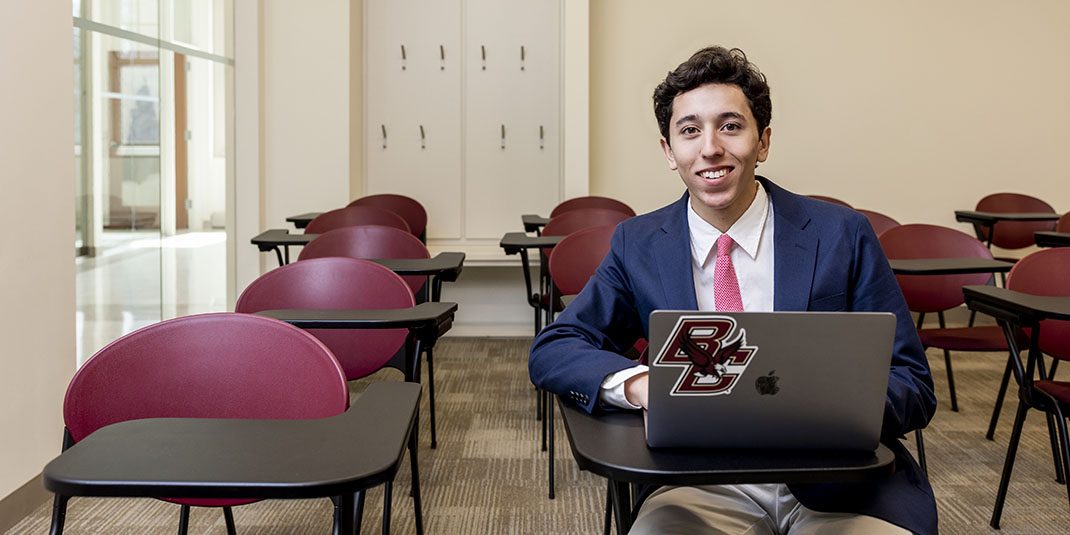When Luke Stanise '24 came up with the idea for BC Wordle, he thought 'How is this not a thing already?' Photos by Caitlin Cunningham.
Like any viral trend, the popular online game Wordle has inspired numerous offshoots, ranging from the hilarious to the obscene. There’s a four-letter-word version called “Sweardle,” a J.R.R. Tolkien-inspired “Lordle of the Rings,” and now, thanks to sophomore Luke Stanise ’24, there’s “BC Wordle.”
Launched in mid-February, BC Wordle offers a similar experience to the original game—six chances to guess a five-letter word—but with a Boston College spin. Every solution relates in some way to the University, whether it’s the name of its president (L-E-A-H-Y), mascot (E-A-G-L-E), or one of its residence halls (K-E-Y-E-S, V-A-N-D-Y). A new version of the game becomes available every day at midnight at www.bcwordle.com.
Stanise, a business major in the Carroll School of Management and a computer science and Hispanic Studies minor, got the idea for BC Wordle while sitting in his Web Application Development class. Using the programming languages he’d learned thus far—HTML, CSS, and Javascript—he mocked up a game that looked and felt like the original, complete with square letter tiles that spin and change color. Getting the details right was important to Stanise, a Wordle superfan who plays multiple iterations of the game every day (his line-up includes “Taylordle” (Taylor Swift), “Dordle” (two Wordles in one), “Quordle” (four), and “Squabble” (battle royale)).
“One of the hardest things to do was to find a way to make yellow letters switch to green,” he recalled. “I spent two or three hours trying to make that happen. It was so tedious and annoying but I did it.”
A distinguishing feature of Wordle, and one that boosted its early popularity, is a pop-up box that appears when players successfully guess a word, inviting them to share their scores, or “grids,” via social media. Stanise built a similar function into BC Wordle, and began posting his own score on Herrd, an anonymous social media app built by and for the BC community. It caught on quickly, and Stanise watched traffic to his site go from the single digits to upwards of 3,000 a day in the span of several weeks. At midnight, when he posted a new word, several hundred players would be waiting.
“I was five minutes late a few times so I started setting my alarm for 11:50,” laughed Stanise. “I’d get out of bed, change it, and then go back to work. It was actually only recently that I was able to make it switch automatically.”
Analytics show the majority of players are logging in from residence halls on the Heights, but Stanise has also noticed overseas university addresses, presumably from students studying abroad. When he began seeing visits from wifi networks at J.P. Morgan and the Boston Police Department, he knew alumni and parents were getting in on the fun as well.
“I get to see the span and depth of how far it’s gone, which is pretty cool,” he said. “I feel like I’m starting to understand how much change I can make with the Internet and social media. Hopefully the people playing are having fun, and it’s something they can look forward to.”
Stanise gained all the skills needed to create BC Wordle from his computer science classes at BC, but he’s always enjoyed building things and teaching himself new skills. Five months into learning how to program, he built an app to help investors calculate the average cost of stocks, and listed it on Apple’s App Store for 99 cents. And last summer, while interning for an executive recruiting firm, he programmed a bot to browse LinkedIn profiles based on certain search criteria and pull the information of promising candidates into an Excel spreadsheet.
“I love automating that type of stuff and I know that little projects can be bought by big companies,” he explained. “Wordle was bought for a couple of million dollars by The New York Times. If I could make a company out of something someday, that could end up being really great.”
Alix Hackett | University Communications | April 2022




